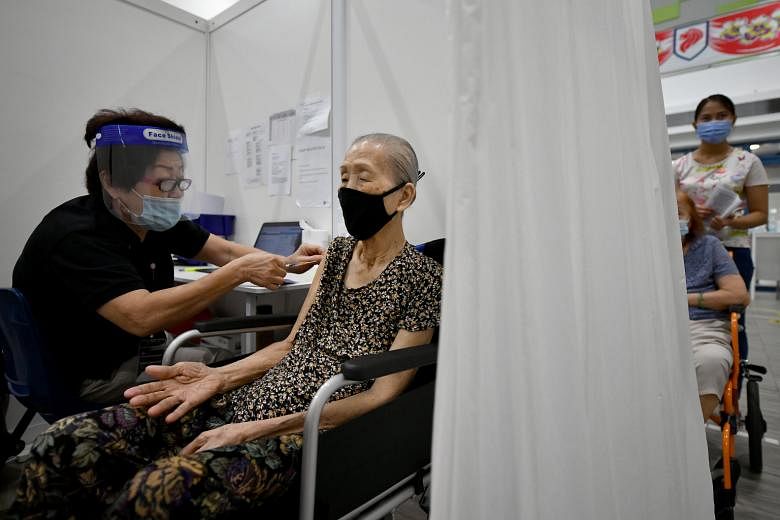SINGAPORE - With Covid-19 cases rising in the community, getting vaccinated is now a matter of life and death for seniors here, experts said.
Health experts warned that more clusters are likely to form in nursing homes, given the close proximity of seniors living near each other and the regular footfall of staff changing shifts.
Professor Dale Fisher, a senior infectious diseases consultant at the National University Hospital (NUH), urged relatives of unvaccinated seniors in nursing homes to review their stance and get their older kin vaccinated as soon as possible, as they face a higher risk of severe illness should they get infected.
"Efforts may need to be stepped up to keep nursing homes safe as infection can spread easily among the seniors given the transmission in the community," Dr Fisher said.
"Those with co-morbidities who are unvaccinated should get their two doses over the next month and those who are already vaccinated should opt for a booster shot," he added.
Precautionary measures have been stepped up at nursing homes after more than 100 Covid-19 cases were detected among staff and residents of aged-care facilities over the past week.
There were 1,012 new cases on Sunday (Sept 19), the second day in a row that new Covid-19 cases passed the four-digit mark.
The Ministry of Health (MOH) announced earlier this month that all visits to residential care homes would be suspended until Oct 11 to minimise the risk of transmission.
A spokesman from Jamiyah Nursing Home, which reported 15 cases - three of staff and 12 among residents - said the premises have undergone a few rounds of deep cleaning and staff are donning full personal protection gear to prevent transmission.
A spokesman for Windsor Convalescent Home, which reported 10 cases comprising one staff and nine residents on Sept 19, said the home has worked closely with MOH and the Agency for Integrated Care to test residents and staff in the affected area for Covid-19.
"We understand that this development may cause concern. We seek your understanding to give us the space and time to focus on the health and well-being of our residents and staff, as that is our top priority," she added.
Residential homes for the elderly, as well as welfare homes and homes for those with disabilities, have reported Covid-19 clusters in the past.
The first nursing home to report Covid-19 infections was the Lee Ah Mooi Old Age Home in Thomson Lane on April 1 last year.
During the circuit breaker period, all homes serving the elderly, which included adult disability homes, nursing homes and welfare homes, underwent mass testing for all residents and staff to detect infections early and ring-fence any clusters.
Speaking on the sidelines of the Singaporean Researchers Global Summit at the Nanyang Technological University on Monday (Sept 20), Singapore's director of Medical Services Kenneth Mak said the Government was working to increase the percentage of vaccinated clients and residents in nursing homes.
He said: "We've made quite significant inroads, many of them are vaccinated now so that's good, but we could do better because there're still some who have not been vaccinated, often because either they object themselves or their families have not agreed to give permission for their loved one to be vaccinated."
Infectious diseases expert Leong Hoe Nam cited changing shifts between staff at nursing homes, communal activities, and visits by next-of-kin as some reasons clusters could have surfaced at nursing homes prior to the suspension of visits.
Dr Leong said those who are unvaccinated should complete their vaccinations as soon as possible not just to protect themselves, but also to ensure the healthcare system does not become overwhelmed.
"The statistics speak clearly: those who are not vaccinated require hospital care, and deprive someone else of a much-needed hospital bed. It deprives a vaccinated individual who developed an acute illness such as acute appendicitis of the chance for treatment."
He added: "If we say no to vaccines, we must seriously remember the potential hurt we can cause others, especially when healthcare resources are now limited."












